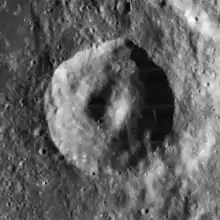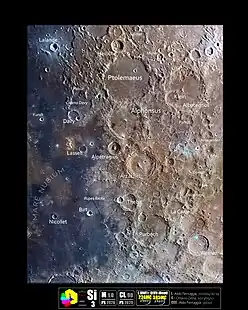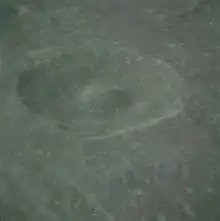Alpetragius (crater)
Alpetragius is a lunar impact crater located on the eastern edge of Mare Nubium, to the southwest of the much larger crater Alphonsus. In the southeast is the prominent crater Arzachel, and to the west lies the flooded Lassell. Alpetragius is a Latinization of the name of Nur ad-Din al-Bitruji, a Spanish-Arab astronomer.[1]
 Lunar Orbiter 4 image | |
| Coordinates | 16.0°S 4.5°W |
|---|---|
| Diameter | 40 km |
| Depth | 3.9 km |
| Colongitude | 5° at sunrise |
| Eponym | Nur ad-Din al-Bitruji |


The most notable feature of this crater is the disproportionately large central peak, which forms a rounded rise that occupies almost the entire crater floor—one-third the crater diameter—and rises to a height of 2.0 km. There is evidence that this peak has been enlarged through volcanic eruptions, and there appears to be an eroded vent at its summit. The rim has fine terraces that slope down to near the edge of the central rise along the south and east sides. This outer wall is nearly round, with slight protrusions on the north and west sides.

The outer rim is joined to the southwest rim of Alphonsus by a rise in the surface. An arc of craterous depressions from the south rim of Alphonsus curves to the west, dividing Alpetragius from Arzachel crater. To the west-northwest is the crater-like outline of Alpetragius X, now flooded by the mare and overlain across the east by ejecta from Alpetragius. Alpetragius is similar in appearance to Behaim crater, although Behaim is larger.
Satellite craters
By convention these features are identified on lunar maps by placing the letter on the side of the crater midpoint that is closest to Alpetragius.
| Alpetragius | Latitude | Longitude | Diameter |
|---|---|---|---|
| B | 15.1° S | 6.8° W | 10 km |
| C | 13.7° S | 6.1° W | 2 km |
| G | 18.2° S | 6.5° W | 12 km |
| H | 18.0° S | 6.0° W | 5 km |
| J | 18.0° S | 5.7° W | 4 km |
| M | 16.5° S | 3.2° W | 24 km |
| N | 16.7° S | 3.8° W | 11 km |
| U | 17.7° S | 5.1° W | 14 km |
| V | 18.1° S | 5.8° W | 17 km |
| W | 17.9° S | 6.0° W | 27 km |
| X | 15.6° S | 5.7° W | 32 km |
References
- "Alpetragius (crater)". Gazetteer of Planetary Nomenclature. USGS Astrogeology Research Program.
- Andersson, L. E.; Whitaker, E. A. (1982). NASA Catalogue of Lunar Nomenclature. NASA RP-1097.
- Bussey, B.; Spudis, P. (2004). The Clementine Atlas of the Moon. New York: Cambridge University Press. ISBN 978-0-521-81528-4.
- Cocks, Elijah E.; Cocks, Josiah C. (1995). Who's Who on the Moon: A Biographical Dictionary of Lunar Nomenclature. Tudor Publishers. ISBN 978-0-936389-27-1.
- McDowell, Jonathan (July 15, 2007). "Lunar Nomenclature". Jonathan's Space Report. Retrieved 2007-10-24.
- Menzel, D. H.; Minnaert, M.; Levin, B.; Dollfus, A.; Bell, B. (1971). "Report on Lunar Nomenclature by the Working Group of Commission 17 of the IAU". Space Science Reviews. 12 (2): 136–186. Bibcode:1971SSRv...12..136M. doi:10.1007/BF00171763. S2CID 122125855.
- Moore, Patrick (2001). On the Moon. Sterling Publishing Co. ISBN 978-0-304-35469-6.
- Price, Fred W. (1988). The Moon Observer's Handbook. Cambridge University Press. ISBN 978-0-521-33500-3.
- Rükl, Antonín (1990). Atlas of the Moon. Kalmbach Books. ISBN 978-0-913135-17-4.
- Webb, Rev. T. W. (1962). Celestial Objects for Common Telescopes (6th revised ed.). Dover. ISBN 978-0-486-20917-3.
- Whitaker, Ewen A. (1999). Mapping and Naming the Moon. Cambridge University Press. ISBN 978-0-521-62248-6.
- Wlasuk, Peter T. (2000). Observing the Moon. Springer. ISBN 978-1-85233-193-1.
External links
Related articles
- Wood, Chuck (November 27, 2006). "A Long Line in a Clutter of Magnificence". Lunar Photo of the Day. Archived from the original on June 14, 2011.
- Wood, Chuck (February 13, 2007). "New Observations of a Well-Known Area". Lunar Photo of the Day. Archived from the original on June 14, 2011.
